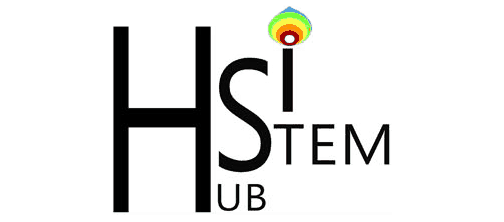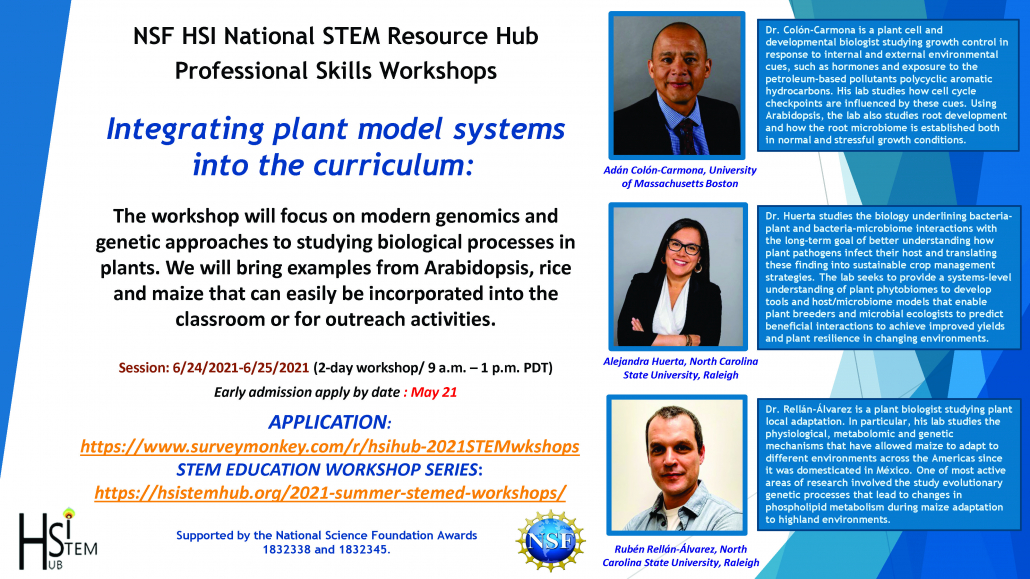Integrating Plant Model Systems into the Curriculum
Workshop Summary
This workshop will introduce the use of plant model systems when incorporating genetic and genomic content in undergraduate biology courses. The instruction team will bring examples from Arabidopsis thaliana, rice and corn. Educational modules have been developed using publically available resources and represent experimental approaches taken to study complex biological questions in the areas of genetics, genomics, cell biology, physiology and development.
Learn about the whole summer series here:
https://hsistemhub.org/2021-summer-stemed-workshops/
Goals of the Workshop
- To introduce the use of plants in the curriculum at the undergraduate levels.
- To learn about publically available plant genetic, genomic and educational resources.
- To develop a plan to incorporate plants in courses taught.
Tentative Schedule
Pending
Eligibility
Enrollment is free and is limited to 20 participants per workshop. It is hoped that the small workshop size will facilitate networking and promote collaboration across institutions by individuals who share common interests in research and education.
Participation priority is for current HSI faculty and staff who teach undergraduate STEM courses. Non-HSI faculty staff who teach undergraduate STEM courses are eligible to apply if they: 1) currently collaborate as PIs/co-PIs on a funded or pending NSF EHR/DUE grant that includes HSI faculty/staff as PI/co-PIs or 2) would like to network to find HSI partners for future collaborative projects in education or research.
Admission priority is for faculty within the first 10 years of their first academic tenure-track appointment. Applicants should be aware that the selection process strives for diverse geographical and institutional representation. The selection decision is final and summary reviews are not provided.
Apply
Submit your application at this link: https://www.surveymonkey.com/r/hsihub-2021STEMwkshops
Learning Objectives
- Learn to combat “plant blindness” by utilizing educational modules that use plant model systems
- Learn how to navigate plant genetic and genomic resources
- Learn about three key plant genetic experimental systems, Arabidopsis, rice and corn
Workshop Details
Workshop Speakers

Dr. Adán Colón-Carmona, Professor, Department of Biology, University of Massachusetts Boston
Professor Colón-Carmona is a plant cell and developmental biologist studying growth control in response to internal and external environmental cues, such as hormones and exposure to the petroleum-based pollutants polycyclic aromatic hydrocarbons. His lab studies how cell cycle checkpoints are influenced by these cues. Using Arabidopsis, the lab also studies root development and how the root microbiome is established both in normal and stressful growth conditions. (https://www.umb.edu/academics/csm/faculty_staff/adan_colon_carmona)

Dr. Alejandra Huerta, Assistant Professor, Department of Entomology and Plant Pathology, North Carolina State University, Raleigh
Assistant Professor Huerta studies the biology underlining bacteria-plant and bacteria-microbiome interactions with the long term goal of better understanding how plant pathogens infect their host and translating these finding into sustainable crop management strategies. The lab seeks to provide a systems-level understanding of plant phytobiomes to develop tools and host/microbiome models that enable plant breeders and microbial ecologists to predict beneficial interactions to achieve improved yields and plant resilience in changing environments. (https://phytobacteriology.wordpress.ncsu.edu/).

Dr. Rubén Rellán-Álvarez, Assistant Professor, Biochemistry Department, North Carolina State University, Raleigh
Assistant Professor Rellán-Álvarez is a plant biologist studying plant local adaptation. In particular, his lab studies the physiological, metabolomic and genetic mechanisms that have allowed maize to adapt to different environments across the Americas since it was domesticated in México. One of most active areas of research involved the study evolutionary genetic processes that lead to changes in phospholipid metabolism during maize adaptation to highland environments. (https://www.gemmalab.org/)
Workshop Sponsors and External Links





